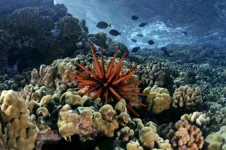(Press-News.org) In a compelling Genomic Press Interview published in Brain Medicine on September 25, 2024, Professor Hermona Soreq of the Hebrew University of Jerusalem in Israel unveils the profound implications of her groundbreaking research on the cholinergic system and small RNA regulators in brain-body communication.
Prof. Soreq, holder of the Endowed Slesinger Professorship of Molecular Neuroscience, has dedicated her career to unraveling the complexities of the parasympathetic nervous system, with a particular focus on acetylcholine's role in stress responses and neurodegenerative diseases. Her work has revolutionized our understanding of how the brain and body interact under various conditions, from daily stress to acute trauma.
"I am fascinated by the concept of multi-leveled regulation of molecular brain activities and seek to understand it in terms of mental and neurodegenerative diseases," Prof. Soreq explains in the interview. This fascination has led to significant discoveries, including the cloning of human cholinesterase genes and the identification of microRNA-132 as a key controller of the cholinergic pathway.
Prof. Soreq's recent shift towards studying transfer RNA fragments (tRFs) has opened new avenues for understanding cognitive decline in Alzheimer's disease, particularly in women. Her findings suggest that rapidly declining control of tRFs over cholinergic transcripts may be a crucial factor in the progression of cognitive deterioration. This insight raises intriguing questions about the potential for sex-specific treatments in neurodegenerative diseases. Could targeted therapies that address tRF regulation offer more effective interventions for women with Alzheimer's?
The interview also highlights Prof. Soreq's contributions to understanding Parkinson's disease and the impact of pre-delivery stress on newborns. Her multi-faceted approach to neuroscience research reflects the unique landscape of stress-related studies in Israel, providing a comprehensive view of cholinergic-regulated states and diseases.
"Others look up to me in my field of expertise, and I am well cited and frequently invited to lecture about my work," Prof. Soreq notes, underscoring the impact of her research on the scientific community. Her work not only advances our understanding of brain function but also paves the way for potential new treatments in neurodegenerative and stress-related disorders.
The Genomic Press Interview offers a rare glimpse into the personal journey of this esteemed scientist. Prof. Soreq shares how her high school science teacher first sparked her interest in research, leading her to a summer school at The Hebrew University – an experience that set the course for her illustrious career.
Prof. Soreq's approach to science is characterized by a relentless curiosity and a belief that "Nature makes no mistakes." This philosophy has driven her to seek out new surprises and uncover the regulatory nature of her discoveries. Her work raises profound questions about the future of neuroscience research. How might our understanding of brain-body communication reshape approaches to mental health treatment? What role could small RNA regulators play in developing targeted therapies for stress-related disorders?
As the interview delves into Prof. Soreq's personal reflections, it reveals a scientist deeply committed to her work, even in challenging times. "Going to work has become a relief from the burdens of everyday stresses, which are genuinely very heavy these days. So, work is my refuge from war," she shares, providing a poignant insight into the resilience of scientific pursuit in the face of adversity.
The Genomic Press Interview with Prof. Hermona Soreq not only showcases her remarkable scientific achievements but also offers a deeply human portrayal of a researcher at the forefront of neuroscience. Her work continues to push the boundaries of our understanding of brain function and opens up exciting possibilities for future research and therapeutic interventions.
The full interview, titled “Hermona Soreq: Revolutionizing neuroscience by elucidating the roles of poly(A) tails, mRNA stability, small RNA regulators and acetylcholine in brain-body communication throughout the lifespan," will be published in Brain Medicine on September 24, 2024. It will be freely available online at https://bm.genomicpress.com/aop/
About Brain Medicine: Brain Medicine (ISSN: 2997-2639) is a peer-reviewed journal published by Genomic Press, New York. Brain Medicine is a new home for the cross-disciplinary pathway from innovation in fundamental neuroscience to translational initiatives in brain medicine. The journal’s scope includes the underlying science, causes, outcomes, treatments, and societal impact of brain disorders, across all clinical disciplines and their interface.
Contact: Hermona Soreq, PhD, Professor of Molecular Neuroscience, The Hebrew University of Jerusalem, Israel: hermona.soreq@mail.huji.ac.il
END
Neuroscience luminary Hermona Soreq sheds light on the roles of RNA regulators in neurodegenerative diseases
Genomic Press Interview reveals Hebrew University Professor Soreq's groundbreaking research on acetylcholine and small RNA regulators in brain-body communication throughout the lifespan
2024-09-25
ELSE PRESS RELEASES FROM THIS DATE:
Ancient reef-builders dodged extinction — at least temporarily
2024-09-25
Will modern coral reefs go extinct? The answer is uncertain, but some of their ancient counterparts managed to dodge a bullet — for a while, at least.
Scientists from Osaka Metropolitan University have discovered that ancient reef-building organisms called stromatoporoids survived the Late Devonian mass extinction event and continued to thrive as major reef-builders long after their presumed extinction. These findings shed light on how life on Earth has responded to past environmental changes, offering ...
Citizen scientists help discover microplastics along the entire German coastline
2024-09-25
The global production of plastics and the resulting plastic waste has increased to such an extent that plastics have become ubiquitous in our environment. Plastics of various sizes are also found along the German North Sea and Baltic coasts. Previous studies of microplastic pollution on German beaches have often been limited to a few locations. In the citizen science project “Microplastic Detectives”, researchers from the Alfred Wegener Institute, together with citizens, have now collected samples from beaches along the entire German coast to be analyzed for microplastics. The resulting dataset is the first to be large enough to ...
Rising waters, waning forests: How scientists are using tree rings to study how rising sea levels affect coastal forests
2024-09-25
Sunlight filters through the canopy of pines, holly, sweet gum, and red maple while bird calls echo in the distance. These coastal forests may seem like others in the Mid-Atlantic, but a hidden challenge looms. Standing tall next to their salt marsh neighbors, where the wind carries the sharp scent of sulfidic seawater, these trees are more than just part of the landscape—they are living monuments to a rapidly changing environment. As sea levels rise, the future of these forests is uncertain. While the adjacent salt marshes can adapt to encroaching waters, the trees, vulnerable to the increasing frequency ...
Night-time noise linked to restless nights for airport neighbours
2024-09-25
Noise from aircraft at night is linked with disturbed sleep quality and sleep-wake cycle, a new study using movement trackers has shown.
Environmental health experts at the University of Leicester combined measurements from activity monitors and self-reported sleep information for the first time to put together a more detailed picture of how aircraft noise impacts sleep, in the largest such study to date.
The results, published in Environmental Health Perspectives, show that people exposed to higher levels of night-time aircraft noise experienced more restlessness during sleep and disruption in daily sleep rhythm, even if they had a full night’s sleep.
The team was led from the ...
Fossils from the Adriatic Sea show a recent and worrying reversal of fortunes
2024-09-25
If you’d stopped monitoring the Adriatic Sea’s marine life in the mid-20th century, the outlook would have been promising. Snails and the clams they hunt for food increased in abundance for several decades during the late 1800s and early 1900s, evidence of a vibrant and healthy ecosystem.
Then, a threshold was crossed. Populations of both predator and prey abruptly plummeted and in some cases disappeared entirely. They were replaced by the common corbulid clam (Varicorbula gibba), which has the ability to slow down its metabolism in unfavorable conditions. Whenever paleontologists find an abundance of this species in the marine fossil record, it often means ...
With curtailed carbon emissions, corals can survive climate change
2024-09-25
KANEOHE, HI (Sept 24, 2024 1:05 p.m. HST)- In a study published today in Proceedings of the Royal Society B, researchers at the UH Hawaiʻi Institute of Marine Biology (HIMB) Toonen- Bowen “ToBo” Lab have identified scenarios under which eight of the most common species of coral found in Hawaiʻi can adapt to and survive ocean warming and acidification. The corals in the study are prevalent throughout the Indo-Pacific, a region that comprises more than two-thirds of the coral reefs on planet Earth, and were found to be capable of surviving a “low ...
Global prevalence of short-sightedness in children and teens set to top 740 million cases by 2050
2024-09-24
Around 1 in 3 children and teens around the world is short (near)-sighted, with the global prevalence of myopia set to top 740 million cases by 2050 in this age group, finds a pooled data analysis of the available evidence, published online in the British Journal of Ophthalmology.
Female sex, East Asian or urban area residence, and educational level all seem to be key factors influencing prevalence, the findings indicate.
Short (near)-sightedness (myopia), which describes difficulty seeing objects at a distance, typically starts in early childhood and tends to worsen with age, explain the researchers. It has emerged ...
Urgent rethink of bottled water’s huge and growing toll on human and planetary health
2024-09-24
The huge and growing toll bottled water is taking on human and planetary health warrants an urgent rethink of its use as 1 million bottles are bought every minute around the globe, with that figure set to rise further still amid escalating demand, warn population health experts in a commentary published in the open access journal BMJ Global Health.
Some 2 billion people around the world with limited or no access to safe drinking water rely on bottled water. But for the rest of us, it’s largely a matter of convenience and the unshaken belief—aided and abetted by industry marketing—that bottled water is safer and often healthier than tap ...
Women still missing out on treatment for their No 1 killer—cardiovascular disease
2024-09-24
Women in the UK, and elsewhere, are still missing out on vital treatment for their No 1 killer—cardiovascular disease—despite significant progress in the medical management of heart disease and stroke, concludes a consensus statement published online in the journal Heart.
They continue to be underdiagnosed, undertreated, and underrepresented in clinical trials in all areas of cardiovascular disease, says the statement. Among other things, it calls for dedicated women’s heart champions and heart hubs, plus a women’s ...
Palestinian education ‘under attack’, leaving a generation close to losing hope, study warns
2024-09-24
The ongoing war in Gaza will set children and young people’s education back by up to five years and risks creating a lost generation of permanently traumatised Palestinian youth, a new study warns.
The report, by a team of academics working in partnership with the United Nations Relief and Works Agency for Palestinian Refugees in the Near East (UNRWA), is the first to comprehensively quantify the war’s toll on learning since it began in October 2023. It also details the devastating impact on children, young people and teachers, supported by new accounts from frontline staff and ...
LAST 30 PRESS RELEASES:
Trapping light on thermal photodetectors shatters speed records
New review highlights the future of tubular solid oxide fuel cells for clean energy systems
Pig farm ammonia pollution may indirectly accelerate climate warming, new study finds
Modified biochar helps compost retain nitrogen and build richer soil organic matter
First gene regulation clinical trials for epilepsy show promising results
Life-changing drug identified for children with rare epilepsy
Husker researchers collaborate to explore fear of spiders
Mayo Clinic researchers discover hidden brain map that may improve epilepsy care
NYCST announces Round 2 Awards for space technology projects
How the Dobbs decision and abortion restrictions changed where medical students apply to residency programs
Microwave frying can help lower oil content for healthier French fries
In MS, wearable sensors may help identify people at risk of worsening disability
Study: Football associated with nearly one in five brain injuries in youth sports
Machine-learning immune-system analysis study may hold clues to personalized medicine
A promising potential therapeutic strategy for Rett syndrome
How time changes impact public sentiment in the U.S.
Analysis of charred food in pot reveals that prehistoric Europeans had surprisingly complex cuisines
As a whole, LGB+ workers in the NHS do not experience pay gaps compared to their heterosexual colleagues
How cocaine rewires the brain to drive relapse
Mosquito monitoring through sound - implications for AI species recognition
UCLA researchers engineer CAR-T cells to target hard-to-treat solid tumors
New study reveals asynchronous land–ocean responses to ancient ocean anoxia
Ctenophore research points to earlier origins of brain-like structures
Tibet ASγ experiment sheds new light on cosmic rays acceleration and propagation in Milky Way
AI-based liquid biopsy may detect liver fibrosis, cirrhosis and chronic disease signals
Hope for Rett syndrome: New research may unlock treatment pathway for rare disorder with no cure
How some skills become second nature
SFU study sheds light on clotting risks for female astronauts
UC Irvine chemists shed light on how age-related cataracts may begin
Machine learning reveals Raman signatures of liquid-like ion conduction in solid electrolytes
[Press-News.org] Neuroscience luminary Hermona Soreq sheds light on the roles of RNA regulators in neurodegenerative diseasesGenomic Press Interview reveals Hebrew University Professor Soreq's groundbreaking research on acetylcholine and small RNA regulators in brain-body communication throughout the lifespan







